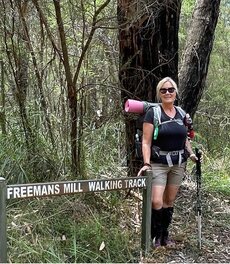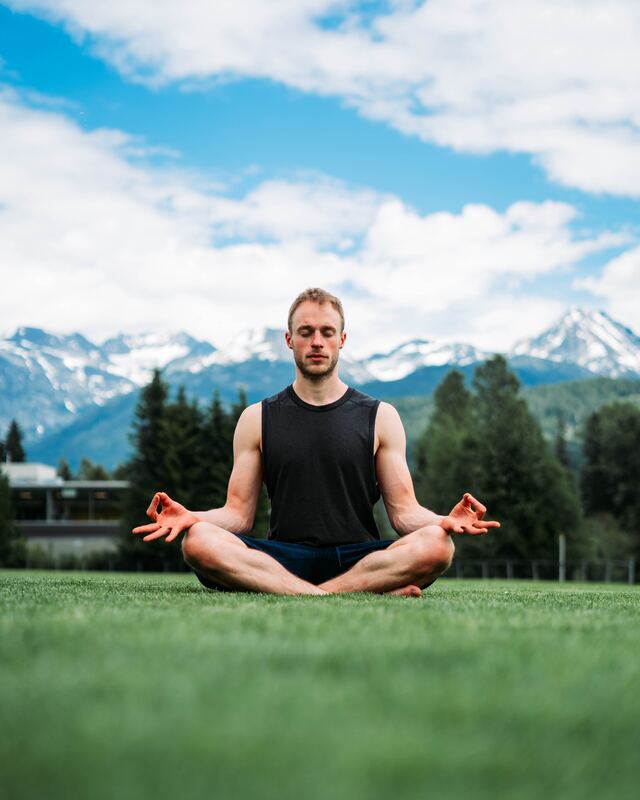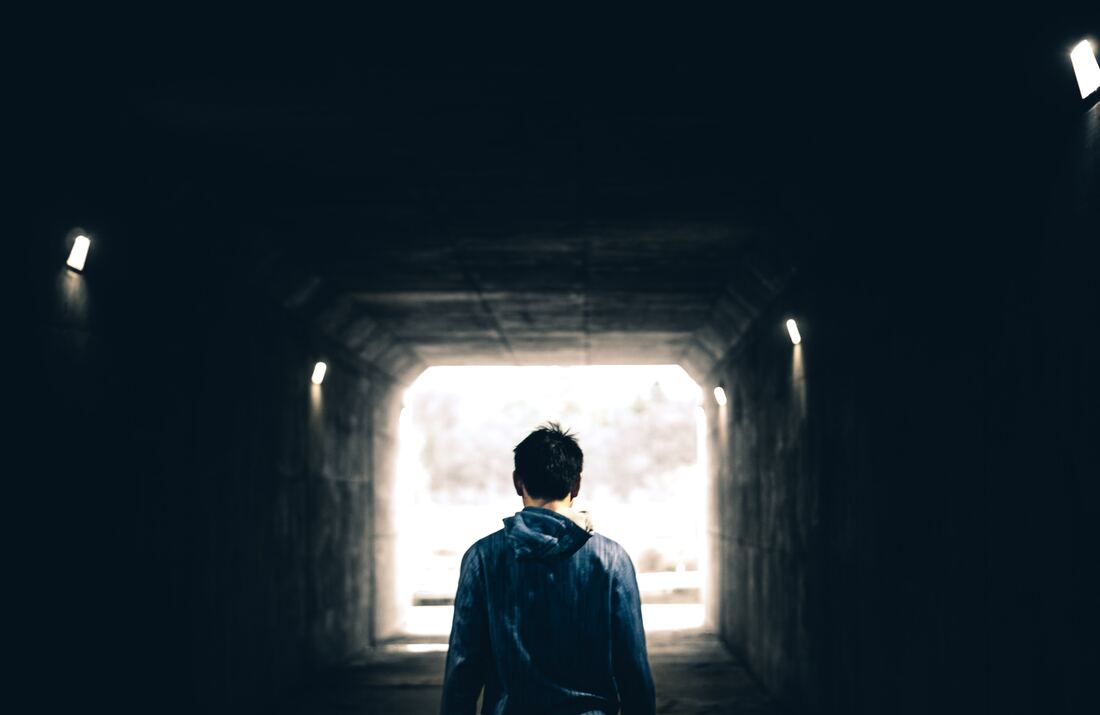|
Firstly, thank you to those who read my previous blog about overtraining. If you’d like to read it, click here Andrea's Adventures - Overtraining. In that, I shared my experience of falling into a big black hole due to overtraining in the hope that it will help you identify your own red flags. In this blog, I want to share my journey of my road to recovery using a number of different training and recovery practices. These are things you might find helpful to do before the fact rather than after like I did. Before I launch into things, and it’s something I should have mentioned in the previous blog; there is another factor at play here which would not have helped in my approach to my training and subsequent ‘demise’. And that is that I am a postmenopausal woman. Women going through the menopause transition may find that what worked for them previously, isn’t working so well these days. It’s very common! There’s a lot at play regarding the effect of hormones on training and recovery. If you're going through the menopause transition (perimenopause, menopause, post menopause) this can make a difference to how you approach your training and recovery. Another topic for another time. A Visit To The DocSo, at the end of my previous blog I mentioned that I went to see someone who works with athletes. On this note, don’t ever think that because you’re not an elite athlete you’re not ‘worthy’ of seeking help from professionals in the field. The bloke I was referred to is the sports physician for an elite sports team here in Melbourne. I’m a 61-year-old recreational plodder. But so what? Whether you’re like me or an elite athlete, our money is worth the same. Go find someone who knows their stuff! So I found this sports physician who had a way better understanding of how the body and physical activity work together than your family doctor is likely to. Blood Tests He firstly ordered some blood tests which were different to the run-of-the-mill ones. Most came back normal however there were some areas which distinctly required supplementation (based on the level of activity I was doing). A quick word on supplements. Supplementation is an area that you generally don’t need to consider unless you’ve had bloods done and recommendations made by a doctor or professional with relevant qualifications in that field. Why? Sometimes you’d be literally excreting anything excessive to your body’s needs. If you are not deficient, you would simply be throwing your hard-earned $$$ down the loo (I was going to say this more crudely but I think you get the point) Secondly, some supplements can have negative interactions with other meds. And there are a range of other reasons. But to sum it up, if you're concerned you might be deficient in something, get your bloods checked and then be guided by a professional accordingly. As with everything, there are some exceptions but don’t just take things willy-nilly because that’s what grandma swore by or a ‘celebrity’ is spruiking on Insta! Food/Fuelling The doc and I also talked through food and fuelling; not just what I was eating but when I was eating. Training with swim squad at 7pm was a difficult time - I’d eat something super light (maybe a banana) before training so it wouldn’t sit in my stomach, swim hard and then get home around 8.45pm to have a shower and go straight to bed (I am not a night owl). This was not good! Along with not being a GP, I am not a dietitian so I am only reflecting on my situation here. Please do seek advice about your individual situation. Our Summit Strength full package clients are able to access a dietitian who specialises in hikers, trekkers and mountaineers as part of their package. His advice is invaluable. But if you’re not on that program, consider seeking out a dietitian who works with athletes. This has been a game changer for me! How I’m now fuelling both before and after training is vastly different and sees me feeling much more energetic. It allows my body to prepare and recover efficiently. Zone 2 Training Doc and I then went over my training regimen and took a look at my Garmin to see just how I trained. Surprise, surprise, it was ALL Zone 3, day after day with no recovery days! This hard training that I thought was awesome was, in fact, my downfall. Yes, there is absolutely a place for Zone 3 training, however, most training for endurance activities (hiking is an endurance activity) should be in Zone 2. Rowan talks a lot about this when he talks about nose-breathing pace. If you want all the in-depth, you-beaut, sciencey (sp?) stuff, type 'nose-breathing' into the search function in this Facebook group. You'll find a really cool video put together by the man himself. The vid explains why this method of training is so important. Get on it! To be honest, I’m a frustrated sports scientist and reading loads of nerdy stuff about the body and exercise totally floats my boat! If I had my time over and was a half decent student instead of a ratbag (apologies to all my high school teachers!), I’d totally study this. So yeah, I’m not a sports scientist but the evidence out there is pretty compelling around the value of Zone 2 training for endurance activities. If you use a wearable, you'll no doubt be familiar with training zones. There are more accurate measures than heart rate for the various zones but they require testing in a lab or some super complicated formula. So instead, we can use our wearables as a guide. If you don’t use a sports tracker, you can keep your pace in Zone 2 by nose-breathing. When you’re no longer able to breathe through your nose, you’re likely heading out of Zone 2 towards Zone 3. Can’t breathe through your nose for some reason? I can’t. I have awful sinuses, so nose-breathing is a struggle for me. You’re not alone. In this case, aim for a pace where you can comfortably carry on a conversation. Where you can complete full sentences - not gasping between a few words. So why is training at Zone 2 so valuable for endurance athletes? Because it develops our aerobic system and when we continue to train in our aerobic system, we develop it and it becomes more efficient. And over time, this allows us to go for longer without fatiguing. And as we develop it, we find our pace naturally increases. Once you start heading up into Zone 3 and beyond, you are switching over into the anaerobic energy system. Which can be handy for certain times on your hike. But on the whole, Zone 2 is the way to go. As I said, watch the vid for a more eloquent explanation! There is a saying that I’ve heard A LOT since I started looking into my own training - Train Slow to Get Fast. My friends in my tri club say it a lot too. And a lot of them have done Kona (multiple times!). Don’t believe it? Many elite endurance athletes train at 80% Zone 2 and 20% at Zone 3 or above. Some even work at a 90/10 split! I'm not saying you should but it does go to show that Zone 2 (most of the time) is boss regardless of who you are. Talk to your coach about this or do some research. Anyway, I can only speak from my experience. I recently started running again. As a runner, I make a good swimmer. I suck at running. Really suck. But there’s something strangely addictive about it so here I am, again, shuffling along at my local aths track or at parkrun a couple of times a week. At first, I was trying to go hard albeit using the run/walk/run method. I was trying to go flat out during the run intervals. I almost died! My heart nearly burst out of my chest, I could barely breathe and I wanted to vomit. What fun! Not. Then I got myself a coach and he changed everything. I’m still run/walk/running but my run intervals are now much slower however I’m also finding I can go longer. And guess what? In only around 6 weeks, my overall pace has come down heaps AND I felt like I could keep going. I'm not about to run a marathon but my run intervals are getting longer and my walk intervals are getting shorter and I feel awesome! So if you’re out there flogging yourself with your hiking/running/swimming/endurance activity training, don’t! You literally do not need to! Get Yourself a Coach As you know, I’m a hiking coach with Summit Strength. But I suck at coaching myself. I know what I need to do but I ignore all that good stuff and go rogue at times. Which is how I found myself barely able to function for a couple of months. I then found a coach and I was honest with him about my predisposition for going rogue and running myself into the ground. You have to tell your coach this stuff so they can keep an eye on you and plan accordingly. I'm training for a tri so there are three disciplines to train for as well as strength and recovery. Great choice for someone prone to overdoing it, huh? But it can be done right if it's done well. My coach reined me right in. Frustrating at first? You bet! Worth it? Absolutely! I asked him if I could add another run to my week and he said "No". "Not yet anyway" If I was going it alone, I’d have added that extra run and I would’ve ended up back in the disaster zone. I now finish my workouts feeling great instead of experiencing that previous effect of fatigue upon fatigue upon fatigue. I’m learning to be more in tune with how my body feels in certain zones and I now back off if I feel myself tipping over into pushing it. I now train 6 days a week but sensibly! I’m not going hammer-and-tongs at it. I feel full of beans most days now. Having a coach can be invaluable. When I first started as a client with Summit Strength, I never thought I’d achieve the things I did with my hiking. But as I got further into my training with Rowan, I experienced incredible improvements. Your coach takes the guesswork out of everything for you. We plan it for you. You just have to show up and do the work. And we know how to build programs so you’re not going to be at risk of overtraining. Now I know it’s not financially viable for many people to get a coach but if you can, do consider it. But if you can’t, sometimes you can often find some great free online options. These options won’t be specific to your individual needs but they can be a guide. And of course, you can follow all the amazing content that Rowan posts in the Training for Hiking and Trekking Facebook group and on the Summit Strength website. And in the SS podcasts which are loaded with great info! Ego I've also learned to let the ego go and just 'do me'. I'm no longer embarrassed to post a slow activity on Strava. And I know that no one else actually cares either. The power of the socials huh? Don't let them control you. Use them for the great info they can and just enjoy the fact that you're fortunate enough to be someone who can do these activities. Celebrate your wins but don't let every workout be aiming for a PB. That's not how the elite train and neither should you. Strava is fun - make sure it stays that way. Recovery - A vital Part of TrainingDon’t ignore your recovery! Yep, I ignored it. Let me just say that I will NEVER make that mistake again. When I was so burned out that I couldn’t do any training for a period of time, I instead started looking at gentle things I could do, as much for my mental health as anything else. I’ve always hated ‘slow stuff’ such as yoga. I found it too ‘woo woo’ and way too slow. Apart from that, I’m about as flexible as a brick so I found the yoga poses (or asanas as I now call them bc, hello, I’m now a yogi lol!) almost impossible. And they hurt! My daughter Molly does yoga and has tried to get me to do it for years. I scoffed! And scoffed some more. More fool me, right? She was on to something. So then I sucked it up and jumped on YouTube one morning and searched for beginners’ yoga vids. There were loads. Some were truly awful. But I kept looking and came across some that I could actually do (I'm awesome at the laying still on my back at the end of the practice hehe). I also found some stretching workouts for swimmers and runners. I started doing these for around 10 mins every morning on my loungeroom floor in my daggy pajamas. I started to enjoy them and, as a bonus, I also started to feel less stiff. I'm not a fan of all the weird lingo they use but it is calming despite my aversion to it. Mentally, I started to come out of my funk. I still do my little YouTube yoga workouts a few mornings a week now or even more often if I'm feeling frazzled or stiff. On top of the yoga and stretching routines, I started doing breathwork. This is another thing that I previously looked at as being a bit ‘out there’ and not for me. We know how to breathe, right? Well, this has also been a revelation! I love doing it now! Breathwork can take you from a state of stress (where your sympathetic 'fight or flight' nervous system is working overtime) to a calm state (where your parasympathetic 'rest and digest' system returns things to normal). The stressors can be physiological, psychological or a combination of both. I found that by lying on the floor listening to an app to guide me in my breathwork, I felt relaxed and tune with myself. Sometimes, when I finish my workout at the gym, I’ll lie on the floor for 10 mins doing my breathwork. I’m sure other people must think I’ve dozed off into the Land of Nod. But I’m just zenning out to the calming chimes on the app. Other times, I’ll float around in the warm therapy pool and then do some breathwork whilst floating on my back supported by a pool noodle. Bliss! When I turn out the light to go to sleep, I now do breathing practice - I rarely get to ten mins without falling asleep. On top of all of these things, I’ve now also incorporated one recovery day every week. A recovery day can mean different things. It’s nice to mix them up. So here are some ideas: Complete rest - no activity. Don't beat yourself up about doing this. We all need it! Active Recovery - gentle walking, pool walking, yoga, gentle bike riding, tai chi Passive recovery - massage, foam rolling, sauna, massage gun, floatation tank By adding these things to your training, you will have a well-rounded program. And your headspace will love it! (However please be aware that if you live with any form of psychological trauma, you should check with your mental health practitioner before doing some of these things as they could trigger unpleasant reactions in you). There is Light at the end of the TunnelConclusion So here we are, finally out the other side of that dark period of overtraining. It’s been quite the journey. As much as it totally sucked, I’m glad it happened. I learned so much about myself and as a coach, I think it’s great that I was a guinea pig so you don’t have to be! Interestingly, I was speaking with another triathlon coach just this week who has also experienced overtraining. I love that this gives her more insight into her clients and I believe this has also benefited me in working with my clients. What I've learned from overtraining? You don’t need to flog yourself day after day. In fact, this is a bad way to train. Backing off intensity, scheduling in recovery (and actually doing it), eating well but also knowing what to eat when, getting a coach - these have all been life-changing! I am confident that I will not fall back into the bad old ways because I’m already reaping the rewards of these lifestyle changes. To be honest, I don’t really recognise the person I’ve become over a few short months. But in the words of Maxwell Smart, I’m feeling so much healthier, physically and mentally “aaaaaand loving it” I hope this gives you some ideas, strategies, thoughts etc about how you approach your training., especially if you're someone who isn't great at moderation. Feel free to reach out if you have any questions or want to share your own experiences. About the Author Andrea is a coach with Summit Strength, who specialise in helping hikers get strong and pain-free for their adventures. At the age of 54, she discovered a real passion for hiking. But she also discovered just how limiting physical fitness and pain can be on the trail. After signing up to one of the Summit Strength signature programs, she discovered just how much of a difference the right training can make to a hiker's enjoyment and comfort on their adventures. She knows that the journey isn't always easy and 'life' can sometimes impact on our training goals. She shares her insights and experiences with us in her blog articles. These days, as an Online Adventure Coach with Summit Strength, she helps hikers all around the world get fit, strong and resilient for their adventures. Want to get fit, strong and resilient for your hiking adventures?
Check out the Online Summit Program: https://www.summitstrength.com.au/online.html Comments are closed.
|
AuthorRowan is a personal trainer who specialises in training for hiking, trekkers and mountaineers for their bucket list adventures. Archives
July 2024
Categories
All
|
AboutSummit Strength is a personal training for hiking service created specifically to help hikers have the best chance of a safe, enjoyable and successful adventure.
|
Company |
Services |
|
|
© COPYRIGHT 2018. ALL RIGHTS RESERVED.
|
Website Design by My Personal Trainer Website
|





 RSS Feed
RSS Feed
